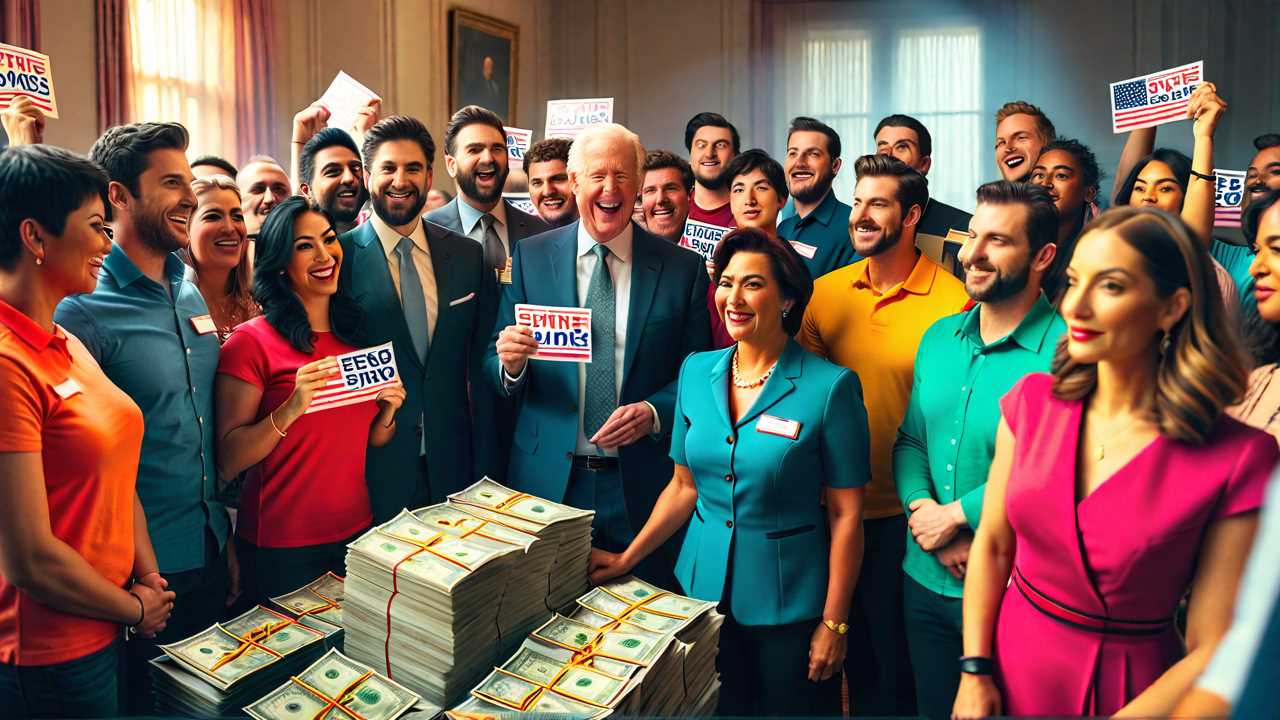Politics
How Are Political Campaigns Funded?

Have you ever wondered about the intricate exploration of financial support behind political campaigns? The funding mechanisms that sustain candidates during their pursuit of office are not only diverse but also impactful in shaping the political landscape. From individual contributions to corporate sponsorships, each dollar invested has the potential to sway decisions and policies. As you ponder the origins of campaign funds and their implications, consider the implications of these financial relationships on the state of democracy and governance.
Sources of Campaign Funding
Political candidates secure campaign funding from various sources, ranging from individual donors and political action committees to corporations and interest groups. Individual donors play a vital role in financing campaigns, as their contributions can directly impact a candidate’s ability to run a successful campaign.
Political action committees (PACs) are another significant funding source, formed to raise money to support candidates that align with their interests. Corporations also contribute to campaigns, often seeking to influence policies that could affect their businesses.
Interest groups, representing specific causes or industries, are known to financially support candidates who advocate for their agendas. Understanding these diverse funding sources is essential for voters to comprehend the potential influences on political candidates and their decision-making processes.
Regulations on Fundraising
Regulations pertaining to fundraising in political campaigns serve as crucial guidelines to promote transparency and accountability in the financial aspects of electoral processes. These regulations are designed to prevent corruption, maintain fairness, and uphold the integrity of the democratic system. In the United States, the Federal Election Commission (FEC) sets limits on individual contributions to candidates, political parties, and political action committees (PACs) to prevent any one donor from exerting undue influence over an election. Additionally, fundraising regulations mandate that campaigns disclose their donors and expenditures, allowing the public to track the flow of money in politics.
Fundraising regulations vary by country, with some nations imposing stricter limits on political donations and spending than others. These regulations aim to level the playing field, ensuring that all candidates have a fair chance to compete for public office without being overshadowed by wealthy donors. By establishing clear rules and oversight mechanisms, fundraising regulations help maintain the credibility and trustworthiness of the electoral process, fostering a sense of belonging and participation among citizens.
Impact of Big Donors
The influence of big donors on political campaigns can’t be understated, shaping the dynamics of electoral races and potentially impacting policy decisions. When large sums of money flow into political campaigns from wealthy individuals or corporations, it often leads to a disproportionate level of influence over the candidates and the subsequent policies they support. Big donors can sway candidates to prioritize certain issues, potentially sidelining the concerns of the general public. This can create a situation where the voices of big donors carry more weight than those of everyday citizens, skewing the democratic process.
Moreover, the impact of big donors extends beyond just financial contributions. These donors often gain access to candidates and policymakers, allowing them to directly advocate for their interests behind closed doors. This access can lead to preferential treatment for big donors, influencing the direction of legislation and regulatory decisions.
Ultimately, the significant influence of big donors raises questions about the fairness and equity of the political system, highlighting the need for greater transparency and accountability in campaign financing.
Transparency in Spending
To comprehend the impact of big donors on political campaigns fully, examining the transparency in spending becomes essential. Transparency in spending provides insight into how campaign funds are utilized and where they originate.
Here are three key points to explore:
- Disclosure Requirements: Transparency regulations often mandate that political campaigns disclose their financial activities, including donations received and expenditures made. This information allows the public to track the flow of money and identify any potential conflicts of interest.
- Public Access to Information: Making spending details publicly accessible fosters accountability and promotes ethical behavior. Citizens can scrutinize how funds are being used, holding candidates and parties accountable for their financial decisions.
- Impact on Voter Trust: Transparent spending practices can strengthen voter trust in the political process. When campaigns operate openly and disclose their financial transactions, it promotes integrity and credibility, ultimately reinforcing the democratic foundation.
Understanding the importance of transparency in spending is vital for maintaining the integrity and fairness of political campaigns.
Frequently Asked Questions
How Do Political Campaigns Utilize Social Media for Fundraising?
To optimize fundraising, political campaigns utilize social media extensively. An impressive 28% increase in online donations was observed when utilizing platforms like Facebook and Twitter strategically. Engaging supporters digitally is now paramount for success.
What Strategies Do Candidates Use to Attract Small Donors?
To attract small donors, candidates often employ grassroots outreach, personalized messaging, and interactive engagement. By connecting with individuals on a personal level, they build relationships, trust, and a sense of community support.
Are There Restrictions on International Contributions to Campaigns?
Across borders, tread lightly. International contributions, a tangled web. Laws restrict, vigilance required. Protect the sanctity of your democracy. Uphold transparency, shield integrity. Your campaign’s coffers, a reflection of your values.
How Do In-Kind Donations Differ From Monetary Contributions?
In-kind donations differ from monetary contributions as they involve non-monetary goods or services. These donations can include volunteer hours, event supplies, or professional services, providing campaigns with resources beyond traditional cash donations.
Can Individuals Donate to Multiple Candidates or Parties?
In terms of supporting political candidates or parties, you have the freedom to spread your donations across multiple choices. This allows you to express your diverse interests and beliefs through financial contributions.

Hello there! I’m Jeremy Ramirez, your go-to guy for all things content marketing and social media at NewsScroller. Currently residing in the vibrant city of Omaha, NE, I’m living my dream of combining my passion for journalism with the dynamic world of digital media.
I’m a proud graduate of the University of Nebraska, where I honed my skills and earned a degree in journalism. My college days were filled with endless learning, coffee-fueled study sessions, and the excitement of discovering the power of storytelling.
Post-graduation, I found my calling at NewsScroller, where I currently lead a team of creative minds in shaping compelling content strategies. Every day is a new adventure here – crafting stories, analyzing trends, and engaging with our vibrant online community.
When I’m not immersed in the digital world, you’ll find me cherishing moments with my amazing wife and our two energetic boys. Our family is completed by Dagwood, our adorable Pug, who always brings smiles to our faces.
Traveling is my escape and inspiration. I love exploring new cultures, tasting local cuisines, and capturing memories through my lens. As a speaker at social media events, I enjoy sharing insights and learning from fellow enthusiasts.
Curious about content marketing strategies or the latest social media trends? Or maybe you want to exchange travel stories? Feel free to reach out. I’m always up for a chat and eager to connect with like-minded individuals. Let’s navigate the exciting world of digital media together!
Want to know more or say hi? Drop me a message anytime!

